Directions (1-5): In the question below three statements are given followed by two conclusions. You have to take the given statements to be true even if they seem to be at variance with commonly known facts. Read all the conclusions and then decide which of the given conclusion logically follows from the given statements disregarding commonly known facts.
Q1. Statements: Only a few second is minute.
Only minute is hour.
Few minute is time.
Conclusions: I. Some hour can be time.
II. All time can be hour.
(a) Only conclusion I follows
(b) Only conclusion II follows
(c) Either conclusion I or II follows
(d) Both conclusions I and II follow
(e) Neither conclusion I nor II follows
Q2. Statements: Only a few chess is Carrom.
Some Carrom is Ludo.
Mostly Ludo is monopoly.
Conclusions: I. All Carrom can be Chess.
II. Some Monopoly can be Chess.
(a) Only conclusion I follows
(b) Only conclusion II follows
(c) Either conclusion I or II follows
(d) Both conclusions I and II follow
(e) Neither conclusion I nor II follows
Q3. Statements: Only Australia is Antartica.
Only a few Australia is America.
Some America is Argentina.
Conclusions: I. Some Antartica is Argentina.
II. All Australia can be America.
(a) Only conclusion I follows
(b) Only conclusion II follows
(c) Either conclusion I or II follows
(d) Both conclusions I and II follow
(e) Neither conclusion I nor II follows
Q4. Statements: All Maza is Sprite.
Some Sprite is Mirinda.
Only a few Mirinda is Limca.
Conclusions: I. Some Limca can never be Mirinda
II. All Mirinda can be Limca
(a) Only conclusion I follows
(b) Only conclusion II follows
(c) Either conclusion I or II follows
(d) Both conclusions I and II follow
(e) Neither conclusion I nor II follows
Q5. Statements: Only a few September is October.
All November is September.
Only September is December.
Conclusions: I. All December can be November.
II. Some December can be October.
(a) Only conclusion I follows
(b) Only conclusion II follows
(c) Either conclusion I or II follows
(d) Both conclusions I and II follow
(e) Neither conclusion I nor II follows
Directions (6-10): In the question below some statements are given followed by two conclusions. You have to take the given statements to be true even if they seem to be at variance with commonly known facts. Read all the conclusions and then decide which of the given conclusion logically follows from the given statements disregarding commonly known facts.
Q6. Statements: All Analog are laptops.
All laptops are Digital.
All Digitals are Speakers.
Conclusions: I. All laptops are speakers.
II. Some speakers are Analogs.
(a) Only conclusion I follows
(b) Only conclusion II follows
(c) Either conclusion I or II follows
(d) Both conclusions I and II follow
(e) Neither conclusion I nor II follows
Q7. Statements: All Blankets are rayon.
All rayon are Quilt.
Some Quilt are Silk.
Conclusions: I. Some rayon are silk.
II. Some quilts are blankets
(a) Only conclusion I follows
(b) Only conclusion II follows
(c) Either conclusion I or II follows
(d) Both conclusions I and II follow
(e) Neither conclusion I nor II follows
Q8. Statements: All stars are Jupiter.
All jupiter are moons.
No moon is Earth.
Conclusions: I. All stars are Earth
II. No moon is a star.
(a) Only conclusion I follows
(b) Only conclusion II follows
(c) Either conclusion I or II follows
(d) Both conclusions I and II follow
(e) Neither conclusion I nor II follows
Q9. Statements: All bulbs are wires.
No wires is cable.
Some cable are brushes.
All brushes are paints.
Conclusions: I. Some paints are cables.
II. Some wires are bulbs.
(a) Only conclusion I follows
(b) Only conclusion II follows
(c) Either conclusion I or II follows
(d) Both conclusions I and II follow
(e) Neither conclusion I nor II follows
Q10. Statements: All potatoes are tomatoes.
All tomatoes are peas.
All peas are brinjals.
All brinjals are gingers.
Conclusions: I. Some Gingers are peas.
II. All tomatoes are brinjals.
(a) Only conclusion I follows
(b) Only conclusion II follows
(c) Either conclusion I or II follows
(d) Both conclusions I and II follow
(e) Neither conclusion I nor II follows
Direction (11-15): In the following questions assuming the given statement to be true, find which of the conclusion(s) among given conclusions is/are definitely true and then give your answers accordingly.
Q11. Statement: F > V ≥ S, W ≤ I < S, N < W
Conclusions: I. W ≤ V
II. V > I
(a) Only I is true
(b) Only II is true
(c) Either I or II is true
(d) Neither I nor II is true
(e) Both I and II are true
Q12. Statement: G > P ≥ B > Q, D ≥ H < Q, U > D
Conclusions: I. P > H
II. G ≤ D
(a) Only I is true
(b) Only II is true
(c) Either I or II is true
(d) Neither I nor II is true
(e) Both I and II are true
Q13. Statement: B > H > Z ≤ L < Q, Z > M > P
Conclusions: I. Z > P
II. M < Q
(a) Only I is true
(b) Only II is true
(c) Either I or II is true
(d) Neither I nor II is true
(e) Both I and II are true
Q14. Statement: F > H > V, A ≤ C ≤ V, A ≥ S
Conclusions: I. F > S
II. A ≤ H
(a) Only I is true
(b) Only II is true
(c) Either I or II is true
(d) Neither I nor II is true
(e) Both I and II are true
Q15. Statement: A > P ≥ H, C < V ≤ T < H
Conclusions: I. V ≤ P
II. P ≥ C
(a) Only I is true
(b) Only II is true
(c) Either I or II is true
(d) Neither I nor II is true
(e) Both I and II are true
Solutions
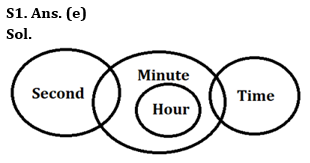
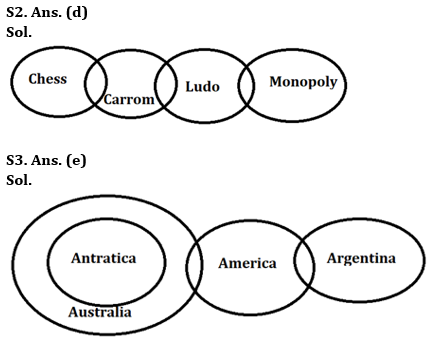
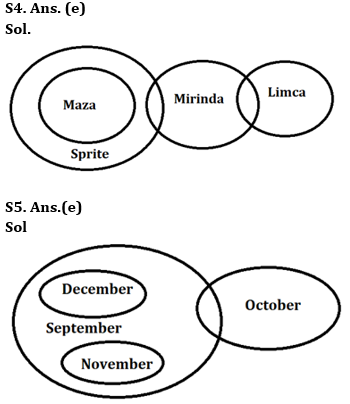
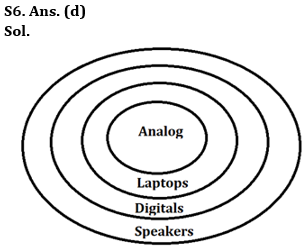
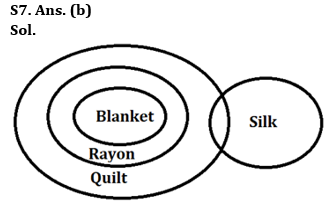
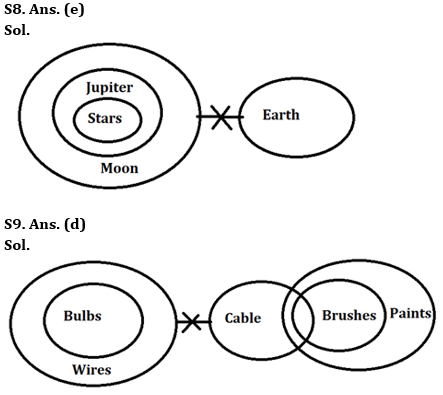
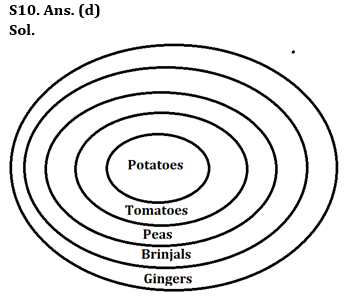
Solution (11-15):
S11. Ans. (b)
Sol. I. W ≤ V – False
II. V > I – True
S12. Ans. (a)
Sol. I. P > H – True
II. G ≤ D – False
S13. Ans. (e)
Sol. I. Z > P – True
II. M < Q – True
S14. Ans. (a)
Sol. I. F > S – True
II. A ≤ H – False
S15. Ans. (d)
Sol. I. V ≤ P – False
II. P ≥ C – False
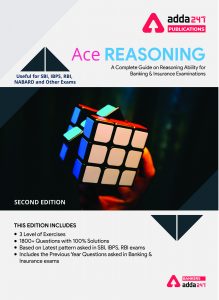




 GA Capsule for SBI Clerk Mains 2025, Dow...
GA Capsule for SBI Clerk Mains 2025, Dow...
 The Hindu Review October 2022: Download ...
The Hindu Review October 2022: Download ...
 Important Blood Relation Questions for S...
Important Blood Relation Questions for S...





